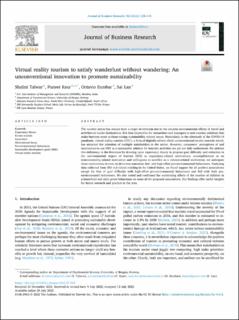| dc.contributor.author | Talwar, Shalini | |
| dc.contributor.author | Kaur, Puneet | |
| dc.contributor.author | Escobar, Octavio | |
| dc.contributor.author | Lan, Sai | |
| dc.date.accessioned | 2023-03-29T11:43:20Z | |
| dc.date.available | 2023-03-29T11:43:20Z | |
| dc.date.created | 2022-08-15T16:12:31Z | |
| dc.date.issued | 2022 | |
| dc.identifier.issn | 0148-2963 | |
| dc.identifier.uri | https://hdl.handle.net/11250/3060895 | |
| dc.description.abstract | The tourism sector has always been a target of criticism due to the adverse environmental effects of travel and activities at tourist destinations. It is thus imperative for researchers and managers to seek tourism solutions that make business sense without raising sustainability-related issues. Particularly in the aftermath of the COVID-19 pandemic, virtual reality tourism (VRT), a form of digitally-driven albeit unconventional ex-situ touristic travel, has attracted the attention of multiple stakeholders in the sector. However, consumers’ perceptions of and motivations to use VRT as a sustainable solution for touristic activities are yet not fully understood. We address this deficiency in the literature by drawing upon expectancy theory to propose goal difficulty and reduction in the environmental impact of tourism (REI) as expectancy-related motivations, accomplishment as an instrumentality-related motivation and willingness to sacrifice as a valence-related motivation; we anticipate these motivations, in turn, to drive two outcomes: low- and high-effort pro-environmental behaviours. Analysing data collected from 350 individuals residing in the United States, we found support for all positive associations except for that of goal difficulty with high-effort pro-environmental behaviours and REI with both pro-environmental behaviours. We also tested and confirmed the moderating effects of the number of children in a household and daily green behaviours on some of the proposed associations. Our findings offer useful insights for future research and practice in the area. | en_US |
| dc.language.iso | eng | en_US |
| dc.publisher | Elsevier | en_US |
| dc.rights | Navngivelse 4.0 Internasjonal | * |
| dc.rights.uri | http://creativecommons.org/licenses/by/4.0/deed.no | * |
| dc.title | Virtual reality tourism to satisfy wanderlust without wandering: An unconventional innovation to promote sustainability | en_US |
| dc.type | Journal article | en_US |
| dc.type | Peer reviewed | en_US |
| dc.description.version | publishedVersion | en_US |
| dc.rights.holder | Copyright 2022 The Author(s) | en_US |
| cristin.ispublished | true | |
| cristin.fulltext | original | |
| cristin.qualitycode | 2 | |
| dc.identifier.doi | 10.1016/j.jbusres.2022.07.032 | |
| dc.identifier.cristin | 2043174 | |
| dc.source.journal | Journal of Business Research | en_US |
| dc.source.pagenumber | 128-143 | en_US |
| dc.identifier.citation | Journal of Business Research. 2022, 152, 128-143. | en_US |
| dc.source.volume | 152 | en_US |

